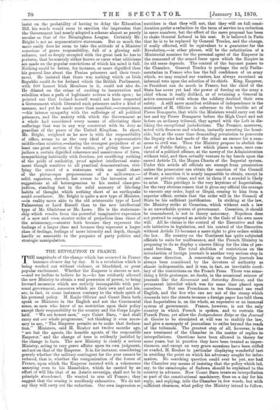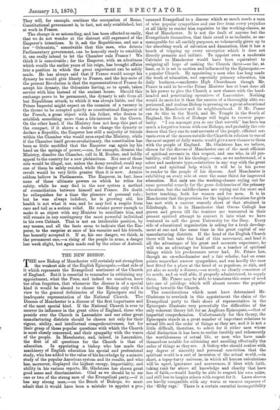THE REVOLUTION IN FRANCE.
THE magnitude of the change which has occurred in France becomes clearer day by day. It is a revolution which is being worked out without violence, or bloodshed, or great popular excitement. Whether the Emperor is sincere or not, —and we incline to believe he is,—he has evidently allowed the new Ministry to obtain a real possession of power, to bring forward measures which are entirely incompatible with per- sonal government, measures which are their own and not his, are, in fact, in some instances contrary to the whole spirit of his personal policy. M. Emile 011ivier and Count Daru both speak as Ministers in the English and not the Continental sense, as men who know of no restriction upon their policy except their responsibility to the country and the Corps Legis- latif. "We are honest men," says Count Daru, " and shall carry out our whole programme," not thinking it even neces- sary to say, " The Emperor permits us to make that declara- tion." Ministers, said M. Rouher not twelve months ago, " are but the agents, the humble agents, of the responsible Emperor," and the change of tone is evidently justified by the change in facts. The new Ministry is clearly a serious Ministry, acting in very grave affairs upon its own judgment, and not on that of the Emperor. It is, for instance, considering gravely whether the military contingent for the year cannot be reduced, that is, whether the reorganization of the forces of France, upon which the Emperor insisted with a vehemence annoying even to his Mamelukes, which he carried by an effort of will like that of an Asiatic sovereign, shall not be in principle abandoned. He wanted to arm all France ; they suggest that the arming is needlessly exhaustive. We do not say they will carry out the reduction. Our own impression as outsiders is that they will not, that they will on full consi- deration prefer a reduction in the term of service to a reduction in mere numbers, but the effect of the more proposal has been to shake General Lebceuf in his seat. It is believed in Paris that he is to be replaced by General Trochu, and the change, if really effected, will be equivalent to a guarantee for the Revolution,—in other phrase, will be the substitution of a. Ministerial nominee for the personal agent of the Emperor in• the command of the armed force upon which the Empire in• its old sense depends. The control of the bayonet passes to the Chamber. General Trochu is perhaps the only Parlia- mentarian in France who has the full confidence of an army which, we may remind our readers, has always exercised an•. informal veto upon the selection of its chiefs. King, Emperor, or President can do much in France, but the chief of the State has never yet had the power of forcing on the army a. chief whom it really disliked, or of retaining a General in, active command with whom the soldiery doubted their own safety. A still more manifest evidence of independence is the statement of M. 011ivier in reference to the terrible act of Pierre Bonaparte, that while the Ministers would carry out the law and try Pierre Bonaparte before the High Court and not before an ordinary tribunal, they agreed with the Left in dis- liking the exceptional jurisdictions. The Premier, moreover, acted with firmness and wisdom, instantly arresting the homi- cide, but at the same time demanding permission to prosecute the Deputy who had made of the crime an excuse for a sum- mons to civil war. Then the Ministry propose to abolish the Law of Public Safety, a law which places a man, once con- victed of a political offence, at the mercy of the Administration without trial, and then actually venture to lay hands upon the sacred Article 75, the Magna Charta of the Imperial system. Under this article all officials are exempt from prosecution unless the prosecutor can obtain the sanction of the Council of State, a sanction it is nearly impossible to obtain, except in cases of private crime, and not in them if a scandal is likely- to arise. This privilege is the very keystone of Imperialism, for the very obvious reason that it gives any official the courage to execute any order, legal or illegal, coming to him from a. superior officer, certain that the order will in the Council of State be his sufficient justification. In striking at the law,. the Ministry strike at Cassarism, which without such a law is an unworkable system of government. Oassarism, it should be remembered, is not in theory autocracy. Napoleon does not pretend to suspend an article in the Code of his own mere will. All he claims is the control of the Executive and the sole initiative in legislation, and his control of the Executive without Article 75 becomes a mere right to give orders within the law. No country on the Continent has quite subjected officials to suits for malfeasance, and the French Ministry in proposing to do so display a sincere liking for the idea of per- sonal freedom. The total abolition of restrictions on the introduction of foreign journals is another very serious step in the same direction. A censorship on foreign journals has always been considered by the devotees of authority as. almost indispensable, and it was, in fact, an inevitable corol- lary of the restrictions on the French Press. There was some- thing a little grotesque, no doubt, in the occasional seizure of journals like the Economist and Saturday Review, and the permanent interdict which was for some time placed upon. ourselves. Not one Frenchman in ten thousand can read English, and the few who can are not of the stamp which_ descends into the streets because a foreign paper has told them that Imperialism is, on the whole, an expensive or an immoral system of government. France, however, is not the only- country in which French is spoken, and to restrain the- French Press, yet allow the litdependastce Beige or the Journal' de Geneve to be circulated at will was to stultify the law, and give a monopoly of journalism to exiles beyond the reach of the tribunals. The greatest step of all, however, is the new treatment of the Chamber in the matter of replies to- interpellations. Questions have been allowed in theory for- some years, but in practice they have been treated as imper- tinences, and except on very grave occasions have been stifled or evaded, M. Rouher in particular displaying wonderful tact in avoiding the point on which his adversary sought for infor- mation. No searching question could ever be put, nor had the Chamber any means of insisting that the policy which led, say, to the catastrophe of Sadowa should be explained to the country in advance. Now Count Darn treats an interpellathm as part of the constitutional machinery, fixes on a day for his reply, and replying, tells the Chamber in few words, but with sufficient clearness, what policy the Ministry intend to follow.
They will, for example, continue the occupation of Rome. Constitutional government is, in fact, not only. established, but at work in France.
The change is so astounding, and has been, effected so easily, that we do not wonder at the distrust still expressed of the Emperor's intentions. Is it, ask the Republicans, and not a few " Orleanists," conceivable that this man, who detests Parliamentary government, can be honestly ready to establish it, can really intend to let the Chamber rule France ? We think it is conceivable ; for the Emperor, with an adroitness which recalls the earlier years of his reign, has brought affairs into a position in which the great experiment can be safely made. He has always said that if France would accept his dynasty he would give liberty to France, and the key-note of the present Revolution is that the representatives of France do accept his dynasty, the Orleanists having, so to speak, taken service with him instead of the ancient house. Should this exchange prove to be permanent, the dynasty is safe from all but Republican attack, to which it was always liable, and the Prince Imperial might expect on the occasion of a vacancy in the throne to be accepted quietly as constitutional Emperor of the French, a great object with his father, who desires to establish something more than a life-interest in the Crown. On the other hand, if the Ministry does not keep this part of the compact, if it shows a desire to change the dynasty or declare a Republic, the Emperor has still a majority of friends within the Chamber who would soon expel the Ministry, while if the Chamber itself grows revolutionary, the constitution has been so little modified that the Emperor can again lay his hand on the springs of power,—can, for example, dismiss the Ministry, dissolve the Chamber, call in M. Rouher, and boldly appeal to the country for a new plebiscitum. Not one of those acts would be illegal, nor, unless the Army revolted, could any one of them be safely resisted, while the danger of an Army revolt would be very little greater than it is now. Armies seldom believe in Parliaments. The Emperor, in fact, loses none of those ultimate powers on which he relies for safety, while he may find in the new system a method of reconciliation between himself and France. No doubt he relinquishes for a time the pleasure of personal rule ; but he was always indolent, he is growing old, his health is not what it was, and he may feel a respite from care and toil as a serious relief. He retains power enough to make it an object with any Minister to conciliate him, and will remain in any contingency the most powerful individual in his own Cabinet. That is not an intolerable position, by any means, and all the facts seem to indicate that the Em- peror, to the surprise at once of his enemies and his friends, has honestly accepted it. If so, his one danger, we think, is the permanent one,—a rising of the people in arms, a danger last week slight, but again made real by the crime of Auteuil.































 Previous page
Previous page